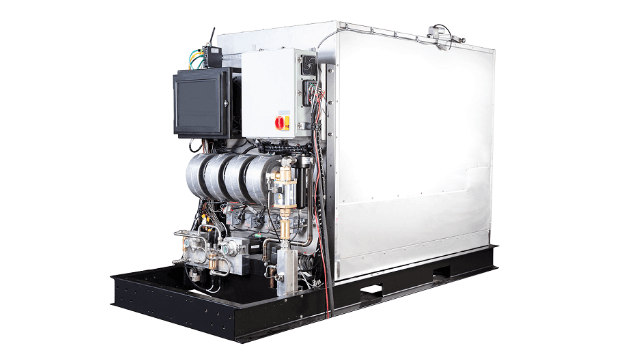Methanol-to-Hydrogen Power Could Boost the Potential of Fuel Cells

Multiple companies are jumping into the race to combine the operational advantages of methanol bunkering with the efficiency of hydrogen fuel cell propulsion. Using a reformer to strip hydrogen off of methanol, a ship can generate its own H2 without the challenges of hydrogen storage.
“Understanding the options for clean, green propulsion may only be the starting point in the goal of reduced emissions. It is a challenge compounded by the potential for long-term impact on ship architecture,” says Bryan Reid, Chief Sales Officer at RIX Industries. “While hydrogen is an appealing answer industry-wide, its deployment is deeply complicated by cryogenic temperature requirements and/or high-volume, high-pressure storage. However, the ability to generate hydrogen on-demand is breaking through these barriers, tapping into safe, convenient methanol to eliminate complexity and achieve decarbonization.”
The high energy density and relatively simple handling requirements of methanol give this fuel an edge for retrofits, since standard bunker tanks can be used to hold methanol instead. The naval architect can design and place tanks in a familiar manner, taking advantage of assymetrical spaces which could never be used to stow a cylindrical liquid hydrogen tank. This frees up deck space and internal volume for cargo - among the reasons that methanol is the future fuel of choice for Maersk Line.
While Maersk plans to combust methanol directly in a conventional two-stroke diesel engine, there is another option for extracting power from this fuel. RIX's reformers take in methanol and produce hydrogen gas, which can be used in a hydrogen fuel cell to generate electricity. Fuel cells have higher thermal efficiency than diesel engines, and their modular design gives the naval architect flexibility for placing them within the ship.

that matters most
Get the latest maritime news delivered to your inbox daily.
RIX will be providing the reformers for e1 Marine's inland towboat design, ordered last year by the vessel operator Maritime Partners LLC. In conjunction with Ardmore Shipping, ABB Marine & Ports and Elliott Bay Design Group, e1 will be building the powerplant for a methanol-to-hydrogen towboat with about 1,700 horsepower and a range of about 550 miles. If the methanol is sourced from a carbon-neutral supplier - rather than a natural gas-based source - the operation of the vessel will be carbon neutral.
“We are particularly excited about the applications for this technology within the inland marine industry, as it offers the potential to materially lower carbon emissions in the near-term and provide a clear path to achieving a zero-carbon footprint. Importantly, we believe this technology is currently cost competitive with diesel internal combustion engines,” said Bick Brooks, Co-Founder and CEO of Maritime Partners, in a statement last year.
